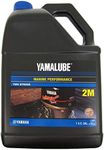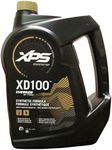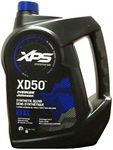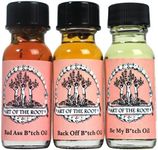Buying Guide for the Best Outboard 2 Stroke Oil
Choosing the right 2-stroke outboard oil is crucial for maintaining the performance and longevity of your boat's engine. The oil you select will impact the engine's efficiency, cleanliness, and overall health. Understanding the key specifications and how they relate to your specific needs will help you make an informed decision. Here are the key specs to consider when selecting 2-stroke outboard oil and how to navigate them.API TC RatingThe API TC rating is a certification given by the American Petroleum Institute that indicates the oil meets certain performance standards for 2-stroke engines. This rating is important because it ensures the oil provides adequate lubrication, reduces deposits, and minimizes wear. Oils with an API TC rating are generally suitable for high-performance engines. If you have a high-performance or newer engine, look for oils with this rating to ensure optimal protection and performance.
Ash ContentAsh content refers to the amount of metallic additives in the oil that can leave deposits in the engine. Lower ash content is important because it reduces the risk of deposit formation, which can lead to engine knocking and reduced performance. Oils with low ash content are ideal for engines that require cleaner combustion and less maintenance. If you use your boat frequently or have an engine that is sensitive to deposits, opt for low ash content oils.
Synthetic vs. Mineral OilSynthetic oils are chemically engineered to provide superior performance, including better lubrication, higher temperature stability, and reduced deposits. Mineral oils are derived from natural crude oil and are generally less expensive but may not offer the same level of performance. If you have a high-performance engine or operate in extreme conditions, synthetic oil is a better choice. For older engines or less demanding use, mineral oil can be sufficient.
BiodegradabilityBiodegradable oils are designed to break down more quickly in the environment, reducing the impact on aquatic ecosystems. This spec is important for environmentally conscious boaters who want to minimize their environmental footprint. If you frequently boat in sensitive or protected waters, choosing a biodegradable oil can help protect the environment.
ViscosityViscosity refers to the thickness of the oil and its ability to flow at different temperatures. Proper viscosity is important for ensuring the oil can adequately lubricate the engine under various operating conditions. Oils with higher viscosity are thicker and may provide better protection at high temperatures, while lower viscosity oils flow more easily in cold conditions. Consider the typical operating temperature of your engine and the climate in which you boat to choose the right viscosity.
Detergent AdditivesDetergent additives help keep the engine clean by preventing the formation of deposits and sludge. This spec is important for maintaining engine performance and longevity. Oils with higher levels of detergent additives are beneficial for engines that are used frequently or under harsh conditions. If you want to ensure your engine remains clean and operates efficiently, look for oils with strong detergent properties.


















